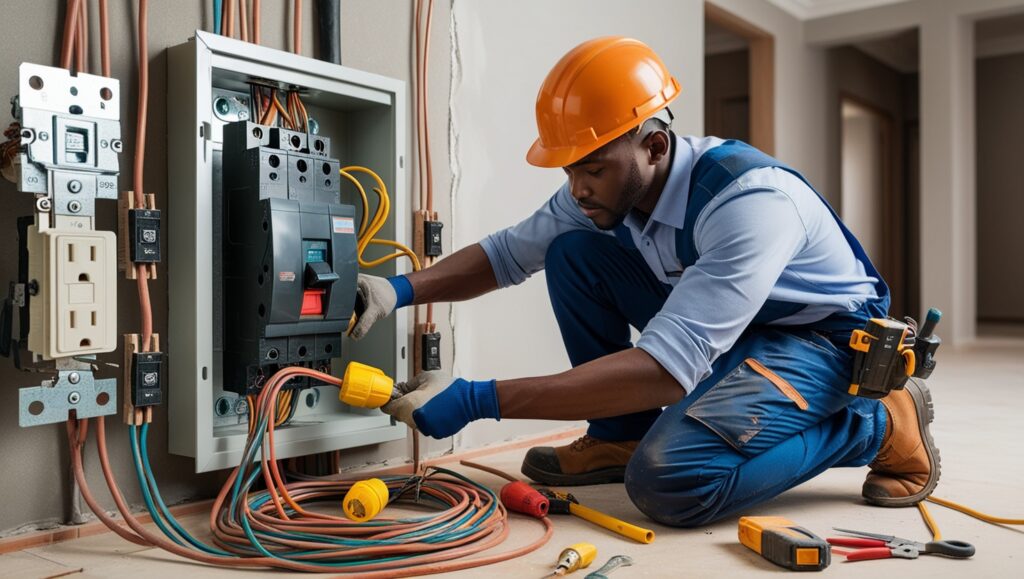When it comes to electrical installations in your home, safety should always be your top priority. Whether you’re remodeling, building from scratch, or just handling minor electrical projects, making mistakes can lead to costly repairs or, worse, dangerous accidents. Below are some of the most common errors homeowners make during electrical installations—and how you can avoid them.
1. Underestimating the Need for Professional Help
One of the most significant mistakes homeowners make is attempting to handle complex electrical installations themselves without professional help. While small tasks like replacing light fixtures or outlets may seem straightforward, larger projects such as rewiring, upgrading your panel, or installing new circuits require knowledge and expertise.
Why it matters: Incorrectly wired systems can lead to fires, electrical shocks, or even system failure. Always consult with a licensed electrician if you’re unsure about the scope of a project.
Tip: If you’re planning to install new outlets or switches or upgrade your electrical panel, it’s best to hire a certified electrician. They can ensure compliance with local codes and guarantee safe installation.
2. Not Planning for Future Needs
Many homeowners make the mistake of only wiring their home for current needs without considering future growth. Whether it’s adding more appliances, lighting, or upgrading to a smart home system, your electrical infrastructure should be able to handle increased demand in the future.
Why it matters: Electrical systems that are too limited can overload, causing circuit breakers to trip or even leading to fires.
Tip: When installing new wiring or circuits, plan ahead for potential additions or upgrades. Add extra outlets, circuits, or even capacity for future electrical needs to avoid the hassle and expense of rewiring later.
3. Using Incorrect Wire Size
Choosing the right wire size is crucial for electrical safety. Using wires that are too thin for the electrical load can result in overheating, causing potential fire hazards. On the flip side, using wires that are too thick may not cause immediate issues, but it’s an unnecessary waste of money and space.
Why it matters: Overheated wires can spark fires or damage your electrical equipment.
Tip: Always check the recommended wire sizes for the appliances or devices you plan to use. An electrician can help determine the correct wire gauge for different circuits and ensure your home is safe.
4. Overloading Circuits
One of the most common mistakes is overloading circuits with too many devices or appliances. Plugging too many items into a single outlet or circuit increases the risk of overheating, tripped breakers, and potential fire hazards.
Why it matters: Overloaded circuits can trip breakers, cause electrical failures, and pose a fire risk.
Tip: Be mindful of how many devices you’re plugging into a single outlet or circuit. Ensure that your circuits are properly balanced and do not exceed their rated capacity. If you find yourself needing more outlets, have an electrician install additional circuits.
5. Ignoring Grounding and GFCI Requirements
Another mistake is neglecting to install proper grounding and Ground Fault Circuit Interrupter (GFCI) outlets, especially in high-moisture areas like bathrooms, kitchens, and outdoor spaces. These features are crucial for protecting your home from electrical shock hazards.
Why it matters: Inadequate grounding can lead to electric shocks or electrical equipment malfunctions, while GFCIs reduce the risk of shocks, especially in damp environments.
Tip: Always install GFCI outlets in areas where water is present (bathrooms, kitchens, garages, etc.), and make sure the system is properly grounded to prevent electrocution risks.
6. Failing to Adhere to Local Electrical Codes
Electrical codes are put in place to ensure safety, reliability, and consistency in electrical installations. Skipping or ignoring local codes is a serious mistake that can result in unsafe wiring or systems that fail to meet safety standards.
Why it matters: Not following electrical codes can lead to hazardous installations that might not only be dangerous but also result in fines, insurance issues, or delays when selling your home.
Tip: Always check your local building codes before starting an electrical project. A licensed electrician will ensure the work meets all necessary standards and helps avoid legal complications.
7. Improperly Installing Light Fixtures and Switches
Incorrectly wiring light fixtures and switches can result in short circuits, malfunctioning switches, or even the potential for electrical fires. Common mistakes include mixing up the wiring for the neutral and hot wires or failing to secure the fixture properly.
Why it matters: Incorrectly installed fixtures and switches can cause system failures, electrical shock, or fires.
Tip: When installing light fixtures or switches, always follow the manufacturer’s instructions, and ensure the power is off before you start working. If you’re unsure about the wiring, have a professional handle it.
Conclusion
Electrical installations, when done properly, are safe and effective in powering your home. However, overlooking key aspects or making common mistakes can put your family, home, and belongings at risk. To ensure safety, always prioritize professional guidance, plan for future growth, use the correct materials, and follow all codes and safety protocols. When in doubt, don’t hesitate to call an experienced electrician who can guide you through the process and provide peace of mind.
By avoiding these common mistakes, you’ll ensure that your electrical systems remain safe, reliable, and up-to-date for years to come.

Great article! I never realized how important it is to plan for future electrical needs. I’m currently remodeling my home, and after reading this, I’m definitely going to make sure the wiring is up to code and future-proof. Thanks for the helpful tips on grounding and GFCI outlets as well—I’ll be sure to have a professional handle the more complex installations!
Totally agree! I made the mistake of not planning for future upgrades during my last renovation, and now I’m stuck with a few circuits that can’t handle the load. Definitely worth investing the extra time to get it right. A professional electrician can really make a difference